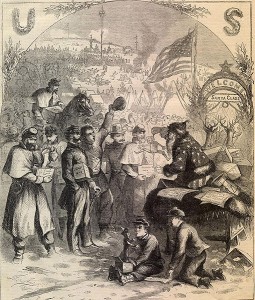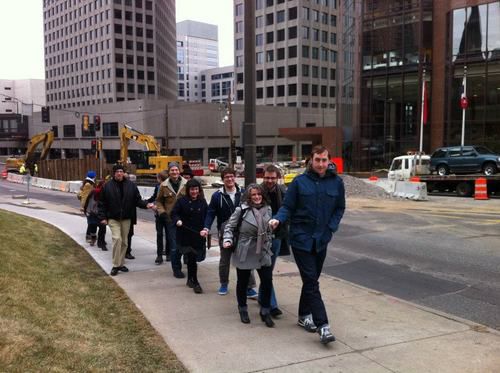What did they know and when did they know it, how to handle a crisis, comedians on a plane, the price of free speech, and bring it, Grinch!
1) WHAT DID THEY KNOW AND WHEN DID THEY KNOW IT?
There aren’t a lot of rules governing the relationship between reporters and politicians, but there’s one that has traditionally been observed by both sides as a sign of basic respect: When asked a question, don’t fib. If you don’t want to answer a question, say, “no comment.”
When four Senate leaders looked at reporters a week ago to announce that Senate Majority Leader Amy Koch had an “improper relationship” with a colleague, they fibbed on the question about when they first knew what they knew.
That revelation was contained in MPR reporters Tom Scheck and Catharine Richert’s story about former Koch chief of staff Cullen Sheehan’s revelation that he blew the whistle on the relationship three months ago.
But it’s this section of the story that raises eyebrows about whether the Senate leaders have tried to cover up elements of the scandal, while insisting they had to reveal it.
Michel acknowledged that Sheehan’s comments contradict the comments he and three other senators made to reporters on Friday. At that time, Michel said the allegations about Koch’s behavior were first reported to them a few weeks ago. Michel said he wasn’t honest about the timeline in an attempt to protect Sheehan and other staffers.
“I felt at that time that if I said two months or whatever that exact number is, that that would have very obviously pointed out who the whistleblower was and I did not want to do that and I felt it was my duty not to disclose that identity,” Michel said.
If that were true, the proper answer is “no comment,” something the senators had no trouble saying in response to a number of other questions that were asked at that news conference. Instead, Michel intended to mislead the reporters — he refers to it as being “intentionally vague” — and, by extension, the people of Minnesota. Ironically, he cited “ethical responsibilities” in announcing the Koch affair in the first place.
“We want to be as open as we can be with you,” Sen. Geoff Michel told WCCO’s Pat Kessler, a few minutes before misleading the assembled questioners.
“There were a number of stories that were being circulated that we were aware of that were absolutely not true,” Sen. David Hann told the Star Tribune this week about why the leaders held last Friday’s news conference. “Things being said needed to be corrected.”
Steering the public down a path with falsehoods wasn’t a very logical way to do it.
Reporters are really good at finding out what’s going on, even when politicians don’t want them to know. Intentionally misleading them doesn’t protect anyone. Capitol reporters will find out the fib and in the end, politicians look untrustworthy, untruthful, and unethical when they’re caught in the deceit.
True, reporters are about as popular as politicians and nobody really cares if they get their feelings hurt. But when a politician answers a reporter, they’re actually talking to the people who foot the bill at the Capitol: all Minnesotans.
Not revealing the correct timeline of the scandal also eliminated the possibility of questioning the logic of the story the four were revealing. Here’s last week’s news conference announcing the Koch affair. Listen to it armed with this new knowledge of the timeline. A great deal of it no longer adds up.
It might be time for the four senators to have another news conference and answer a new question, “Why did it take you three months to confront Sen. Koch on the relationship when both she and the staffer confirmed their relationship to Sheehan in September?” Also, why did Sheehan quit his job while, apparently, waiting for some action to be taken?
2) HOW TO HANDLE A CRISIS
Some companies just “get it” more than others.
Yesterday, a man posted security video of a FedEx delivery of his new computer monitor…
Within hours, FedEx posted its own video on YouTube:
And that’s how you handle a crisis.
3) COMEDIAN ON A PLANE
For most people, taking one flight on an airline these days is a chore. Owen Benjamin, a Los Angeles comedian, has spent the last month on an airplane, vowing to visit as many airports as he could. Fun times.
It’s been a publicity stunt for Lenovo laptops.
Which is worse? Flying on an airplane for a month or spending two hours on one flight listening to bad jokes?
Benjamin broke the record yesterday, he claims, when he ended his stunt in North Carolina.
He visited 63 different airports.
4) THE PRICE OF FREE SPEECH
How much does free speech cost? For some “Occupy” protestors, $355. In Los Angeles, the city prosecutor says he won’t press charges against protesters arrested for … let’s face it… protesting if they pay $355 to a private company for a “lesson” on free speech, the Los Angeles Times reports today.
“The 1st Amendment is not absolute,” he said, noting that the U.S. Supreme Court has ruled government can regulate when, where and how free speech can be exercised.
But a civil rights attorney who has worked closely with the protesters called the class “patronizing,” and said the demonstrators who were arrested are the last people needing free-speech training.
“There they were exercising their 1st Amendment, their lawful right to protest nonviolently,” said attorney Cynthia Anderson-Barker.
5) BRING IT, GRINCH
The only bright side of these Grinch stories in the Twin Cities is we know exactly how they’re going to end.
The latest is the story of Christmas presents, ripped off from the Ottum family in south Minneapolis.
Financial times have been tough. The Ottums moved into their current south Minneapolis home after their own went into foreclosure with Jason thousands of miles away, serving with the National Guard in Kuwait. He volunteered to go because the job market was dismal.
“For someone to come into territory that is not theirs and take, it’s irksome to say the least,” said Jack Jacobs, Kat’s father.
How will this story end? Because there are still more good people than jerks among us, it’ll probably end up like Gethsemane Lutheran Church in Minneapolis. Somebody broke into its food shelf and stole 1,500 pounds of food. In response, companies and people have been sending food and money.
Just one thing: You don’t have to wait until a food shelf has its food stolen to donate food and money to one.
Related Christmasey story: Sarah Palin is upset about the official White House Christmas holiday card.

Not Christmasey enough, she says. And there’s no Christmas tree? And what’s with the dog?
Let’s hit the Wayback Machine and set it for 2003…
The Christmas card/message “tradition” actually started with Abraham Lincoln, who commissioned a cover of Harper’s Weekly.

David Greenberg, a Rutgers associate professor of history and journalism, provides some history…
Not even the ascension of the religious right during Ronald Reagan’s administration upset the careful balance of Christmas cards designed not to exclude or offend. Reflecting not so much the increased power of the Christian right as the broader culture’s commitment to pluralism, the missives now bore messages studded with such phrases as “With special holiday wishes” or “With warmest wishes for the holidays” — a card no one would worry about sending to a Jew, a Muslim, a Hindu or an atheist. Of course, some years the White House cards did make more explicit references to Christmas, and in his official Christmas Day statements, Reagan spoke of “the Christ child” and otherwise got religious. But Bill Clinton and George W. Bush — both of whom, tellingly, grew up in the postwar years of “Protestant-Catholic-Jew”-style pluralism — made general reference to the season’s multiple holidays in their cards, though Bush’s cards also included some biblical verses.
Bonus: The staff of The Current had its holiday outing in downtown Saint Paul yesterday. It’s always cute to see them all together. They grow up so fast.
WHAT WE’RE DOING
Midmorning (9-11 a.m.) – First hour: Minneapolis Parks Foundation president Mary deLaittre discusses her vision for the future of urban parks in the Twin Cities.
Second hour: Chef and food writer Georgia Pellegrini.
Midday (11 a.m. – 1 p.m.) – First hour: University of Minnesota president Eric Kaler.
Second hour: “Jacqueline Kennedy: Historic Conversations on life with John F. Kennedy”. (the recordings with historian Arthur Schlesinger.)
Talk of the Nation (1-3 p.m.) – First hour: Pilot fatigue.
Second hour: Film buff Murray Horwitz talks about the beloved film, “A Christmas Story.”
Plus, the cycles we live by and how they affect everything from where we live to how we eat.


